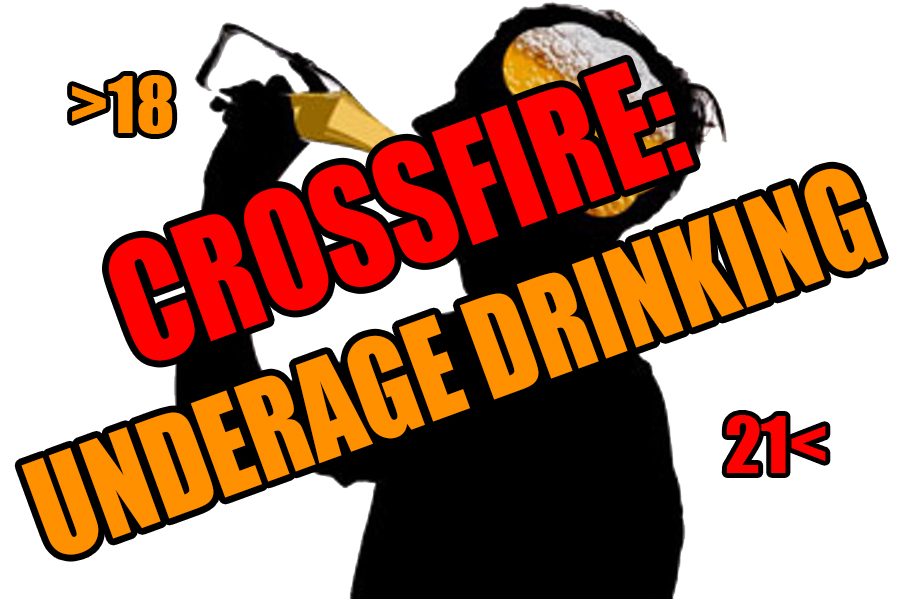CROSSFIRE: Drinking Age Should not be Lowered
Cougar Daily Staff Debate the Drinking Age
October 23, 2017
This article is part of a series, read the opposite opinion here
“Teen alcohol use kills 4,300 people each year,” claims the website of Mothers Against Drunk Driving. These are the facts that young adults are told for much of their lives, the facts meant to scare them into staying on the right path, the “straight and narrow.” For this reason, the question of drinking reminds many teenagers of all the lectures we have been given from teachers, parents, and public speakers. Despite how boring we may find the topic, the dangers of drinking are very real. After all, there must be a reason we’ve been subjected to recurring speeches on the topic; they wouldn’t continually tell us about the issue because it’s something they just like to do. Teenage alcohol consumption leads to nothing but negative consequences, both short term, and long-term, and because of this, the legal drinking age in the United States should not be lowered.
Lowering the drinking age to anything less than 21 could have disastrous effects. Lowering the drinking age to 16 would, understandably, lead to an increase of 16-year-old students drinking. This could also lead to an increase in the drinking habits of those younger than 16, those who would be underage under a legal change. Considering the attitudes expressed towards underage drinking currently, what would be to stop that same mentality from transferring over? The University of California, Davis, reported that young people who begin drinking before the age of 15 are four times as likely to suffer from alcoholism at some point in their life. By this logic, if new laws were put in place concerning the legal drinking age, the number of people addicted to alcohol consumption would skyrocket. In the short term, teenage alcohol consumption could lead to an increase in car crashes, caused by drunk drivers. It could impact the amount of violence both at school and at home, because of how alcohol affects a young person’s actions and emotions. Many young people, especially those who are not always capable of showing the restraint necessary when dealing with alcohol, may begin binge drinking, what the National Institute on Alcohol Abuse and Alcoholism defines as, “a pattern of drinking that brings a person’s blood alcohol concentration to 0.08.” Binge drinking is a habit – an addiction – and can quickly lead to deadly results such as alcohol poisoning.
Those are only the effects of teenage alcohol abuse in the short term. Additionally, alcohol could destroy a student’s academic record, as well as their goals for the future. Let’s follow this hypothetical: a 16-year-old high school student, just like any other sophomore or junior at Coronado, begins drinking the day they are legally allowed to do so: their sixteenth birthday. Unfortunately, without the maturity required to restrain themselves, they begin drinking almost every day, becoming rapidly addicted. Drinking dominates their nights, rather than the homework and socializing that a sixteen-year-old should be doing. Their grades plummet, and without acceptable grades and test scores, they are not able to pursue the future they once dreamed of. This seems outlandish, but in reality is entirely plausible. The long-lasting physical effects can also forcefully direct lives downhill. NPR cites that, in an experiment done, teens who had been known to drink and even binge-drink scored worse on tests that measured their reaction times, spatial skills, and mathematical abilities than their sober peers. Alcohol abuse during adolescence also has a tendency to lead to heart and liver problems later in life. In the long-term, teenagers drinking could be catastrophic to the rest of their life.
If I’m honest and real about my personal opinions on this topic, I’ll be the first to admit I harbor a bias against alcohol. Drinking is, in my mind, a detestable habit that can ruin lives very quickly. I believe that every teenager in the world, and especially every teenager at Coronado, has too much potential to throw it away on something so destructive. However, I’d like to think that I have enough knowledge of the way the world works that I’m not deaf to the obvious. People younger than 21 drink. Coronado students drink. Teenagers will find ways to obtain alcohol, even when they are not legally allowed to purchase it. Despite that, there is something to be said for waiting to drink until your brain is developed, to reaching that final stage of being an adult when you turn 21 and can finally drink alcohol.
Driver’s permits, licenses, voting, drinking, and buying homes all mark significant milestones in a person’s lifetime, and to change that would be to revoke growing up. Rules, fundamentally, are made to be followed; they keep us safe above everything else. Keeping the legal drinking age where it is ensured that the teenagers of America, and of Coronado, can have the best life possible.


